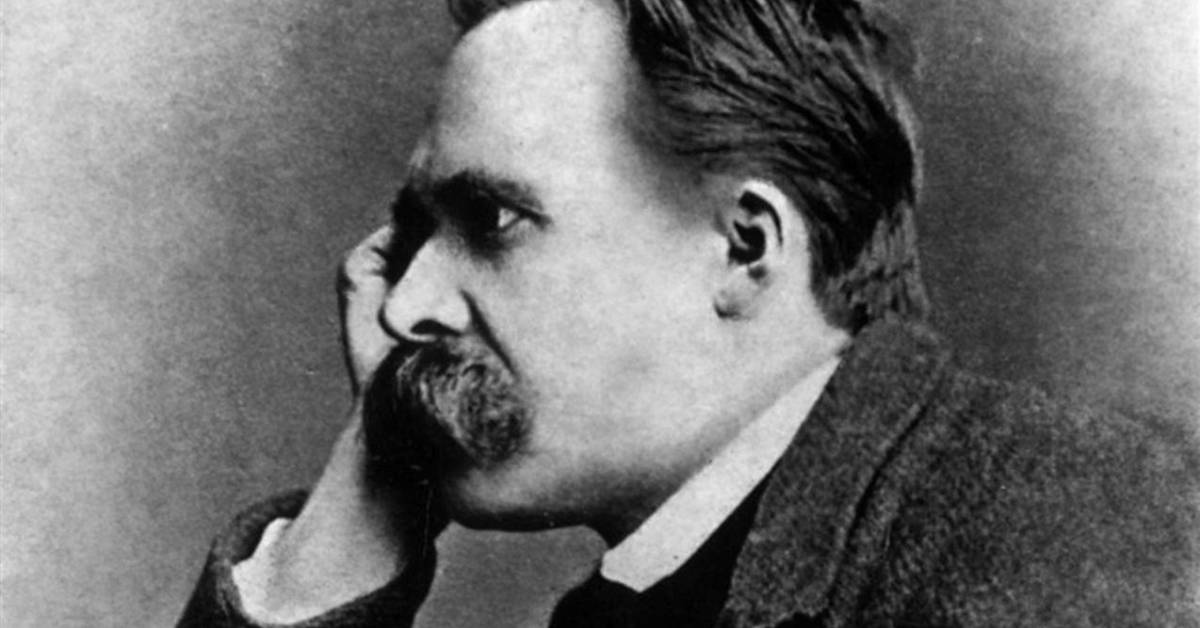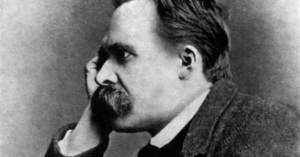

Friedrich Nietzsche is one of the most famous philosophers of all time, yet also one of the most misunderstood. His ideas have been widely quoted, misquoted, and even distorted, often associated with nihilism, radical individualism, or even fascism.
But behind the dramatic reputation is one of the most original and provocative thinkers in history, a philosopher who challenged conventional morality, religion, and truth itself. His influence can be seen in philosophy, literature, psychology, and even pop culture.
So, who was Nietzsche, what did he believe, and where should you start if you want to understand his work? Let’s break it down.
A Short Biography
Friedrich Nietzsche was born in 1844 in Prussia (modern-day Germany). The son of a Lutheran pastor, he was expected to follow a religious path, but his deep curiosity led him to study classical philology (the study of ancient texts) before turning to philosophy.
By his mid-20s, he was a professor, but his career was cut short by chronic illness. Over time, his ideas became more radical, questioning traditional morality, Christianity, and even the concept of absolute truth. His most famous declaration – “God is dead” – wasn’t a celebration of atheism, but a statement about the decline of religious belief in shaping human values.
In 1889, at just 44 years old, Nietzsche suffered a mental breakdown that left him incapacitated for the final 11 years of his life. His sister, who took control of his work, manipulated and misrepresented his philosophy, leading to the false association of his ideas with totalitarianism.
Despite this, Nietzsche’s influence only grew after his death in 1900, shaping modern existentialism, psychology, and literature.
Key Nietzschean Concepts Explained Simply
Nietzsche’s work is vast and complex, but these four ideas are a great starting point:
1. Will to Power
Nietzsche believed that the fundamental drive in all life isn’t survival or happiness, it’s the will to power. This isn’t just about domination or control; rather, it’s the drive to grow, create, and overcome obstacles.
2. “God Is Dead”
One of Nietzsche’s most famous (and controversial) statements appears in The Gay Science:
“God is dead. God remains dead. And we have killed him.”
He wasn’t celebrating this – he was diagnosing a crisis. Nietzsche saw that, with the rise of science and secular thinking, belief in God was fading. But he worried that, without religion, Western society had no foundation for morality, leading to nihilism (the belief that life has no meaning).
3. The Übermensch (Superman)
Nietzsche’s Thus Spoke Zarathustra introduces the concept of the Übermensch (often translated as Superman or Overman).
He believed humanity should aspire to rise above mediocrity, conventional morality, and herd mentality, creating new values and meaning for themselves. The Übermensch is not a dictator or ruler, it’s a self-overcoming individual, someone who fully embraces life, creativity, and strength.
4. Eternal Recurrence
One of Nietzsche’s most challenging ideas is a thought experiment:
“What if a demon were to tell you that you must live this life over and over again, exactly as it is, for eternity? Would you curse him – or rejoice?”
This idea, called eternal recurrence, asks: If you had to relive your life endlessly, would you live differently? It’s a test of whether you’re truly living in a way that fulfils you.
Where to Start: Nietzsche’s Most Beginner-Friendly Texts
Nietzsche’s writing style is punchy, poetic, and often provocative, making him more readable than many philosophers. But where should you start?
- Beyond Good and Evil – A great introduction to Nietzsche’s critique of morality, truth, and society.
- Thus Spoke Zarathustra – His most famous (but most challenging) book, written in a poetic style. It introduces the Übermensch and other key ideas.
- The Genealogy of Morals – Short, sharp, and one of his most influential works, exploring how morality developed and why it’s not as objective as we think.
Conclusion: Why Nietzsche Still Matters
125 years after his death, Nietzsche’s ideas remain as relevant and provocative as ever. He challenges us to question assumptions, seek our own path, and embrace the struggle of life as something meaningful.Nietzsche’s philosophy isn’t about easy answers – it’s about learning to think for yourself. He believed that life is meant to be lived fully, creatively, and with strength. His work remains an invitation to take responsibility for our own values and aspirations, rather than relying on what we’ve been told.
For anyone willing to take up that challenge, Nietzsche is a philosopher worth reading.
Want to explore great thinkers like Nietzsche? Discover how a Campion College liberal arts degree brings philosophy to life.




